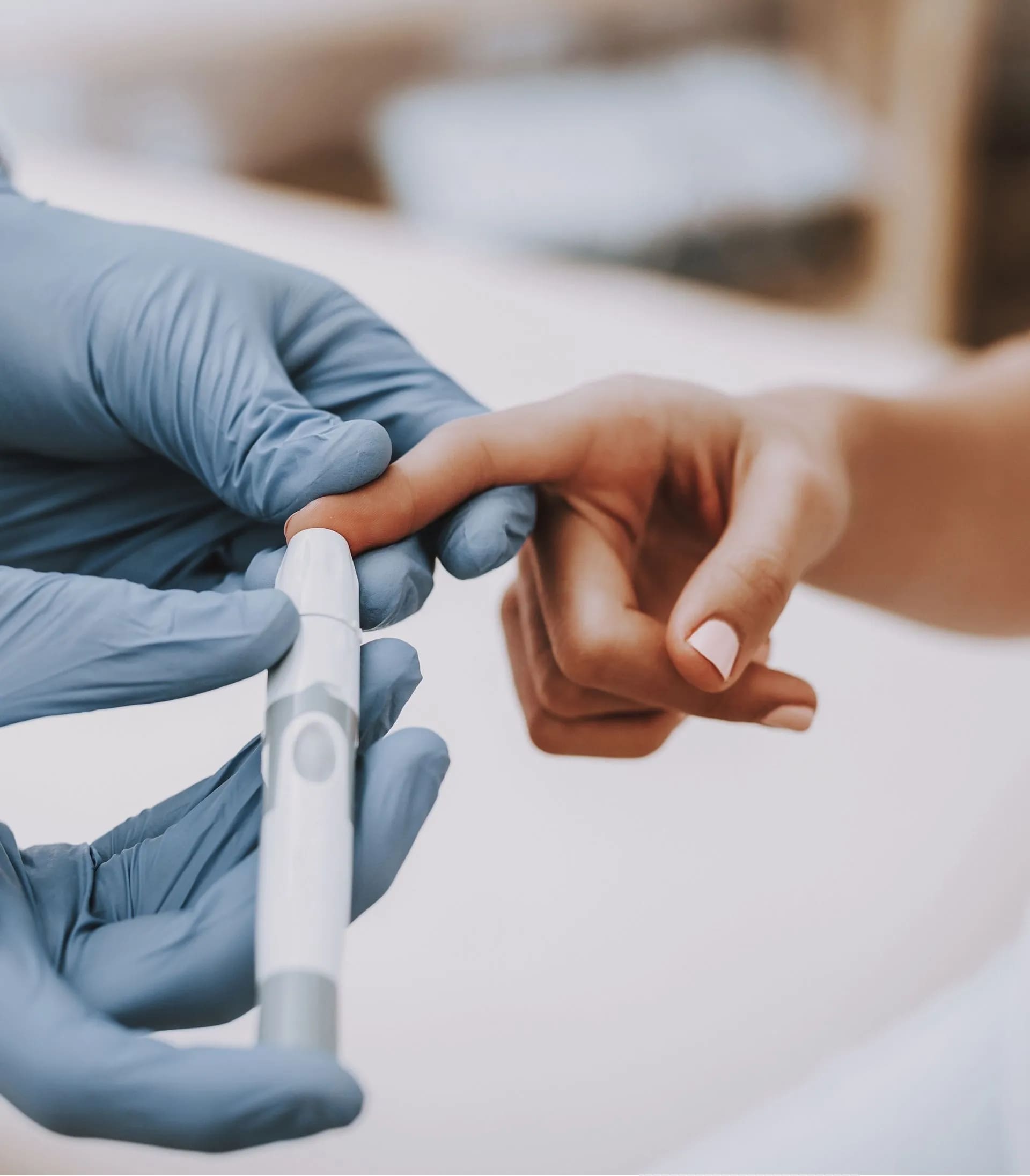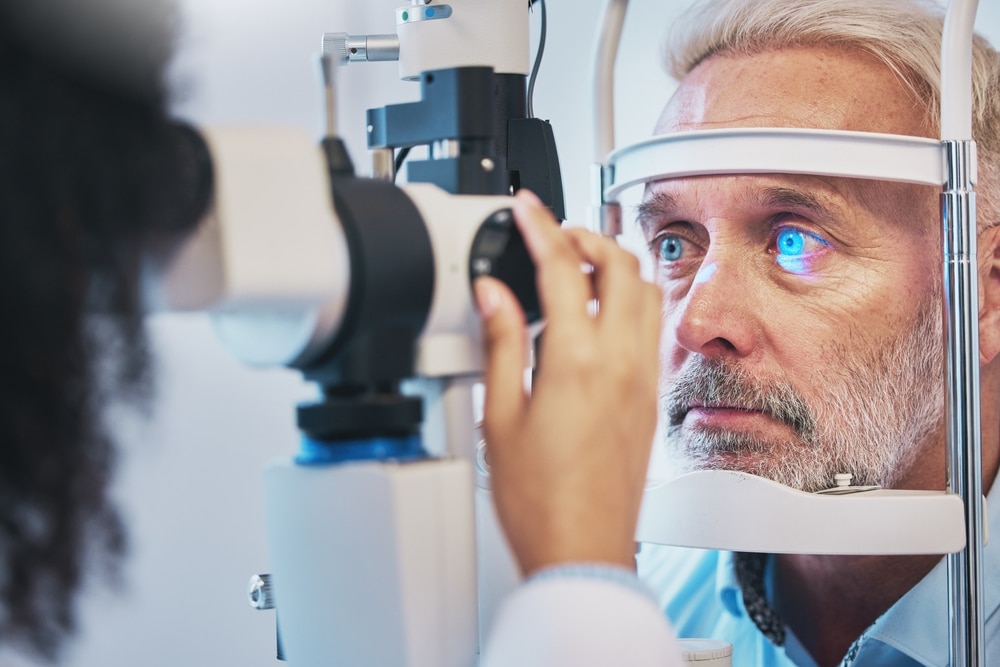Using The Most Innovative Techniques and Technologies
Diabetes Does Affect Your Eyes
Diabetic eye disease is a leading cause of blindness. If you have diabetes, you should have diabetic eye exams at least once a year. Kenneth Weinlander, MD, a board-certified and fellowship-trained ophthalmologist, offers comprehensive diabetic eye exams, among many other eye services, at Milwaukee Eye Surgeons in Milwaukee, WI. Call the practice or book your appointment online today.


Diabetes Eye Q & A
When unmanaged, diabetes damages your blood vessels, including the tiny blood vessels that feed your retinas. Diabetic retinopathy is a disease that occurs when the blood vessels in your retinas leak blood and other fluids that damage and scar your retina.
Diabetic retinopathy is a leading cause of blindness. Fortunately, when diagnosed early during a diabetic eye exam, diabetic retinopathy is treatable.
In addition to the usual tests, he also uses dilating eye drops to widen your pupils and carefully examine your retinas for any signs of damage.
Most of the time, eye diseases like retinopathy, macular edema, glaucoma, and cataracts don’t cause symptoms in their early stages. As diabetic eye diseases progress, you might notice symptoms that include:
- Increase in floaters
- Blurry vision
- Fluctuating visual acuity
- Reduced color vision
- Dark spots in your vision
It’s critical to have routine diabetic eye exams, so Dr. Weinlander can monitor your ocular health and treat diabetic eye diseases before they damage your sight.
During a diabetic eye exam, Dr. Weinlander performs all of the standard eye tests to evaluate your visual acuity and eye health, including glaucoma screenings. In addition to the usual tests, he also uses dilating eye drops to widen your pupils and carefully examine your retinas.
Early identification of the disease is crucial to effective treatment and management of your condition. In addition to prescribing medications and performing laser treatment where appropriate, he works closely with retina specialists who can help you if you have advanced disease.
Dr. Weinlander offers a comprehensive range of eye surgery services and provides thorough consultations and exams to ensure he recommends the best treatment for your condition.
Dr. Weinlander offers intravitreal injections to improve vision and reverse some diabetic damage. He will examine you to see if you are a good candidate for this treatment during your diabetic eye exam.
It’s essential to have diabetic eye exams to protect your eye health and prevent blindness if you have diabetes. Call Milwaukee Eye Surgeons or make an appointment online today.
While the damage caused by diabetic retinopathy cannot be reversed, early detection and treatment can prevent further vision loss and help manage the condition.
A vitrectomy is a surgical procedure that removes the vitreous gel from the eye. It may be needed for advanced diabetic retinopathy with severe bleeding or retinal detachment.
Yes, regular eye exams can detect diabetic eye disease in its early stages before noticeable symptoms occur, allowing for prompt treatment.
Diabetic eye disease is typically not painful but can cause significant vision changes over time. A doctor should evaluate any sudden pain or discomfort.
No, the progression of diabetic eye disease varies based on blood sugar control, blood pressure, and overall health. Regular monitoring and treatment can slow or halt progression.
Treatments for diabetic eye disease depend on the type and severity of the condition but often include controlling blood sugar, blood pressure, and cholesterol to slow progression. For more advanced cases, treatments may involve anti-VEGF injections to reduce abnormal blood vessel growth, laser therapy to seal leaking blood vessels or shrink abnormal ones, corticosteroid injections to reduce swelling, and vitrectomy surgery to remove blood or repair retinal damage. Regular eye exams ensure early detection and timely treatment to preserve vision.
What Happens If Diabetic Eye Disease Is Not Treated?
If diabetic eye disease, such as diabetic retinopathy or macular edema, it can potentially lead to severe complications and even irreversible damage to the eyes.
Below is a list of potential complications that can occur if diabetic eye disease is not treated:
- Vision loss - The most common complication of untreated diabetic eye disease is vision loss. This is usually mild but can worsen without the proper treatment. If it becomes severe enough, untreated diabetic eye disease can cause blindness.
- Retinal detachment - In advanced stages of diabetic retinopathy, scar tissue can start to form on the blood vessels. This increases the risk of retinal detachment. Retinal detachment is a serious medical condition where the retina pulls away from the eye. This causes the eye to lose nutrients and oxygen, which will eventually cause vision loss.
- Neovascular glaucoma - Neovascular glaucoma is a severe form of glaucoma that is characterized by abnormal blood vessel growth and the angle of the eye being closed off. This is typically caused by a lack of blood flow to the retina. Symptoms of neovascular glaucoma include severe eye pain, seeing halos around lights, redness of the eye, headaches, and nausea and vomiting.
- Blindness - If diabetic eye disease is not treated properly and is allowed to progress to advanced stages, it can lead to blindness. In fact, diabetic retinopathy is one of the leading causes of blindness.
It is crucial for any patient who has diabetes to schedule regular eye exams as well as manage their blood sugar, blood pressure, and cholesterol levels. Keeping these in check can help patients reduce the risk of diabetic eye disease and prevent its progression if it occurs. Early detection and treatment are critical to preserving a patient’s eye health and preventing the onset of complications.
How Often Should Diabetic Patients Schedule Eye Exams?
Patients with diabetes should schedule an eye exam at least once a year, even if they do not show signs of diabetic eye disease. For those who have pre-existing eye conditions, you may have to schedule multiple exams every year.
How is Diabetic Eye Disease Treated?
Diabetic eye disease can be treated in a variety of ways. However, the type of treatment needed depends on the condition and how severe it is. Some patients may require medication, while others might need surgery, such as a vitrectomy. You will need to consult with Dr. Weinlander so he can construct a proper treatment plan specific to your needs.

Can Diabetic Eye Disease Affect Both Eyes?
Yes, diabetic eye disease can affect both eyes. This is why it is critical to schedule routine eye exams, as diabetic eye conditions often affect both eyes.
What Lifestyle Changes Can Help Prevent the Onset of Diabetic Eye Disease?
There are various lifestyle changes that can help prevent the onset of diabetic eye disease.
These changes include the following:
- Properly manage your blood sugar levels
- Maintain a healthy weight
- Eat a nutritional, well-balanced diet
- Refraining from smoking
- Getting enough physical activity
Get The Best Eyecare Now
See For Yourself
Book An Appointment Today
"Dr. Weinlander is very knowledgeable, thorough and patient! He spent time helping me understand more about my eye health. I was very satisfied with the service I received."
"Great location, nice office, and personable staff. It was easy to schedule and I was able to get a contacts and glasses prescription. All COVID measures were in place and everything was wiped down and sanitized so I felt super safe. Recommended this place to my mom and I will be visiting again."
"Dr. Weinlander is incredibly knowledgeable and was able to take a more conservative approach to my eye problem where my regular optometrist wanted to do something that would have been painful and costly. I highly recommend setting an appointment at Milwaukee Eye Surgeons."
Don't Let Finances Stop You

We Offer Financing Services
We know that sometimes procedures can feel expensive or unattainable due to limited financing, but that isn't the case.
There are many services out there, as well as some insurance providers, that may help out with the cost of eye care.
Why Choose Milwaukee Eye Surgeons
Milwaukee Eye Surgeons is a leading ophthalmology and corneal surgery practice renowned for exceptional eye care and advanced surgical treatments. Led by Dr. Kenneth Weinlander, a board-certified ophthalmologist and fellowship-trained corneal surgeon, the practice offers a wide range of services from general eye care to specialized surgeries.
Dr. Weinlander is one of the few physicians in the country offering corneal tattooing, an innovative procedure to treat intractable glare caused by iris loss. With expertise in diabetic eye exams and other essential vision care services, Milwaukee Eye Surgeons is committed to delivering the highest personalized care to each patient.
Schedule Your Diabetic Eye Exam Today
Diabetic eye disease is a serious complication of diabetes requiring proactive management to protect your vision. Regular eye exams, diligent blood sugar control, and timely treatment are essential in preventing or slowing the progression of conditions like diabetic retinopathy, macular edema, and glaucoma.
By working with your doctors and staying on top of your eye health, you can take the necessary steps to preserve your vision and maintain a high quality of life. Don’t wait for symptoms to appear—schedule your diabetic eye exam today by calling us at 414-377-5550.

